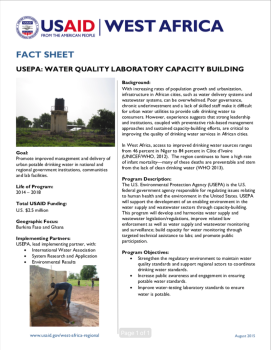With increasing rates of population growth and urbanization, infrastructure in African cities, such as water delivery systems and wastewater systems, can be overwhelmed. Poor governance, chronic underinvestment and a lack of skilled staff make it difficult for urban water utilities to provide safe drinking water to consumers. However, experience suggests that strong leadership and institutions, coupled with preventative risk-based management approaches and sustained capacity-building efforts, are critical to improving the quality of drinking water services in African cities.
The U.S. Environmental Protection Agency (USEPA) is the U.S. federal government agency responsible for regulating issues relating to human health and the environment in the United States. USEPA will support the development of an enabling environment in the water supply and wastewater sectors through capacity-building. This program will develop and harmonize water supply and wastewater legislation/regulations, improve related law enforcement as well as water supply and wastewater monitoring and surveillance; build capacity for water monitoring through targeted technical assistance to labs; and promote public participation. USEPA implemented this program as part of the African Water Association Institutional Capacity Building Program.
- Related: West Africa Drinking Water Laboratory Capacity Program (EPA.gov)


